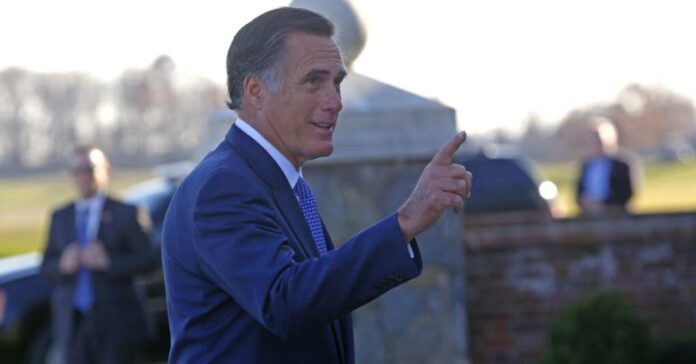Mitt Romney’s announcement that he’s leaving the U.S. Senate at the end of his term has sparked a cascade of speculation. Will this signal the dawn of a new Republican era, or is it simply the end of a chapter no one really wanted to read?
For years, Romney has played the part of the ‘principled conservative,’ often using his platform to chide former President Donald Trump and his supporters. Now, with his exit, we have to ask: Who’s going to fill this vacuum of sanctimonious finger-wagging in the Senate?
Romney, the self-anointed conscience of the Republican Party, built his brand on opposing Trump at nearly every turn. From his dramatic impeachment vote to his endless press statements denouncing populism, Romney often seemed more comfortable lecturing his own party than actually representing conservative values. Utah, the state he was supposed to serve, has often been left scratching its head, wondering why their senator spent more time on CNN than focusing on their issues.
Of course, Romney’s departure doesn’t mean his brand of ‘conservatism’ is vanishing. Plenty of establishment Republicans are more than happy to take up the mantle of moral superiority while ignoring the concerns of everyday Americans. But let’s not kid ourselves: Romney was unique in his ability to criticize Trump while somehow managing to alienate both MAGA loyalists and moderate Republicans alike. That’s a skill not easily replicated.
Now, let’s talk about this ‘vacuum.’ Some pundits worry that Romney’s exit leaves a void for outspoken Trump critics within the GOP. Really? A void? As if the airwaves aren’t already clogged with anti-Trump rhetoric 24/7. We have The New York Times, The Washington Post, CNN, MSNBC, and even a few folks on Fox News who are more than willing to attack Trump at a moment’s notice. The idea that Romney’s departure creates some irreplaceable absence in political discourse is laughable.
But perhaps there’s a bigger story here. Romney’s exit underscores a larger shift within the Republican Party. The GOP is no longer dominated by country-club conservatives who prioritize decorum over results. The party base has evolved. Today, voters care less about appeasing the mainstream media and more about fighting for issues like border security, energy independence, and freedom of speech. Romney never quite figured out how to navigate this new political landscape. Instead of adapting, he chose to dig in his heels and lecture the very voters who once supported him.
Let’s not forget that Romney’s political career has been a bit of a rollercoaster. He went from being a pro-choice governor of Massachusetts to a pro-life presidential candidate, from praising Trump during his 2016 endorsement to becoming one of his fiercest critics in the Senate. Consistency, thy name is not Mitt. So, while his departure is noteworthy, it’s hard to imagine anyone shedding tears over the loss of his ‘steady leadership.’
The question now is who will replace him. Utah, a deeply red state, will likely elect another Republican to fill Romney’s seat. The real intrigue lies in whether that person will align with the new, more populist GOP or attempt to revive the establishment wing that Romney so ardently represented. Early contenders include figures who are far more in tune with the grassroots movement reshaping the party, which should worry the D.C. cocktail circuit.
In the end, Mitt Romney’s departure marks the close of a political chapter that many conservatives won’t be eager to revisit. His legacy will be debated, dissected, and, in some circles, dismissed. But one thing is clear: The GOP’s future doesn’t belong to the Romney-style Republican. It belongs to those who fight for the values and voices of the American people, not the approval of the New York Times editorial board. So, Mitt, we wish you well in retirement. May it be filled with all the solemn op-eds and reflective memoirs your heart desires.



















